The Intel Core i9-9900KS Review: The 5 GHz Consumer Special
by Dr. Ian Cutress on October 31, 2019 10:45 AM ESTCPU Performance: Encoding Tests
With the rise of streaming, vlogs, and video content as a whole, encoding and transcoding tests are becoming ever more important. Not only are more home users and gamers needing to convert video files into something more manageable, for streaming or archival purposes, but the servers that manage the output also manage around data and log files with compression and decompression. Our encoding tasks are focused around these important scenarios, with input from the community for the best implementation of real-world testing.
All of our benchmark results can also be found in our benchmark engine, Bench.
Handbrake 1.1.0: Streaming and Archival Video Transcoding
A popular open source tool, Handbrake is the anything-to-anything video conversion software that a number of people use as a reference point. The danger is always on version numbers and optimization, for example the latest versions of the software can take advantage of AVX-512 and OpenCL to accelerate certain types of transcoding and algorithms. The version we use here is a pure CPU play, with common transcoding variations.
We have split Handbrake up into several tests, using a Logitech C920 1080p60 native webcam recording (essentially a streamer recording), and convert them into two types of streaming formats and one for archival. The output settings used are:
- 720p60 at 6000 kbps constant bit rate, fast setting, high profile
- 1080p60 at 3500 kbps constant bit rate, faster setting, main profile
- 1080p60 HEVC at 3500 kbps variable bit rate, fast setting, main profile
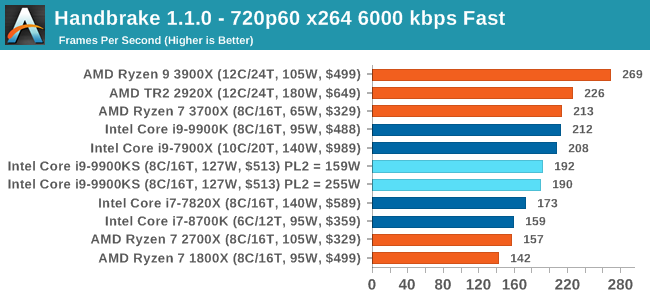
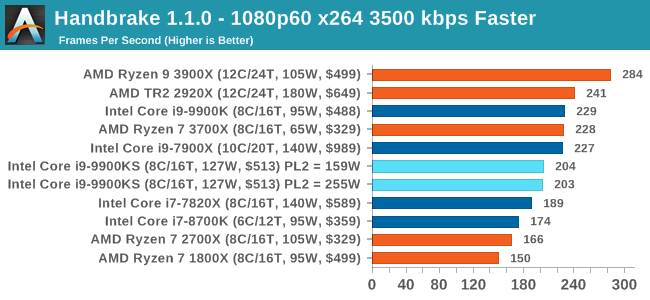
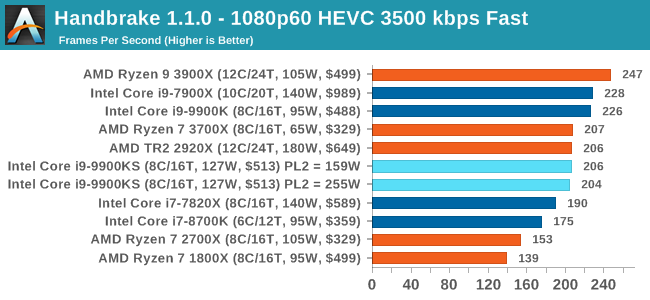
The 9900KS performed worse than our 9900K in our Handbrake tests, and we're not entirely sure why. It might be related to the regression we saw with DigiCortex.
7-zip v1805: Popular Open-Source Encoding Engine
Out of our compression/decompression tool tests, 7-zip is the most requested and comes with a built-in benchmark. For our test suite, we’ve pulled the latest version of the software and we run the benchmark from the command line, reporting the compression, decompression, and a combined score.
It is noted in this benchmark that the latest multi-die processors have very bi-modal performance between compression and decompression, performing well in one and badly in the other. There are also discussions around how the Windows Scheduler is implementing every thread. As we get more results, it will be interesting to see how this plays out.
Please note, if you plan to share out the Compression graph, please include the Decompression one. Otherwise you’re only presenting half a picture.
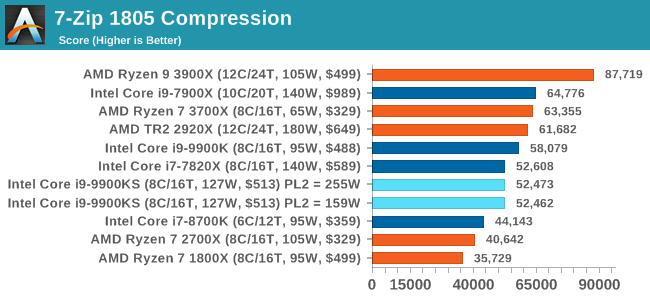
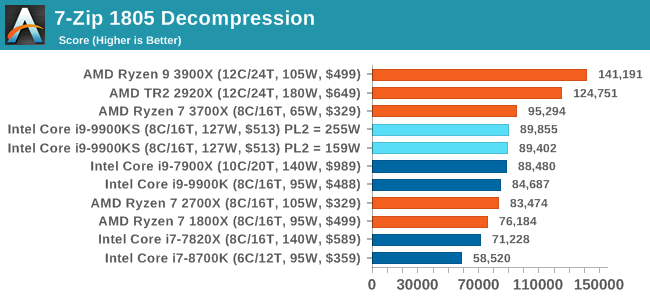
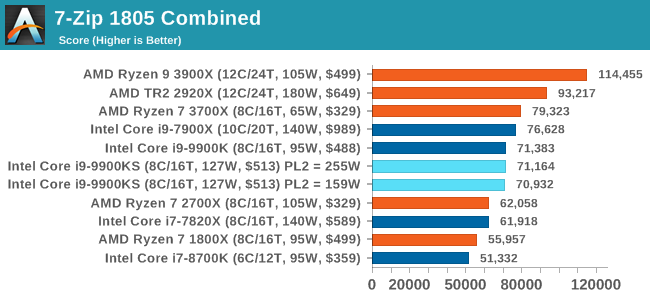
Both the 9900KS settings perform identically here, however the Compression test shows a performance regression compared to the standard 9900K. It does make me wonder if there are additional differences between the two chips (such as an internal clock).
WinRAR 5.60b3: Archiving Tool
My compression tool of choice is often WinRAR, having been one of the first tools a number of my generation used over two decades ago. The interface has not changed much, although the integration with Windows right click commands is always a plus. It has no in-built test, so we run a compression over a set directory containing over thirty 60-second video files and 2000 small web-based files at a normal compression rate.
WinRAR is variable threaded but also susceptible to caching, so in our test we run it 10 times and take the average of the last five, leaving the test purely for raw CPU compute performance.
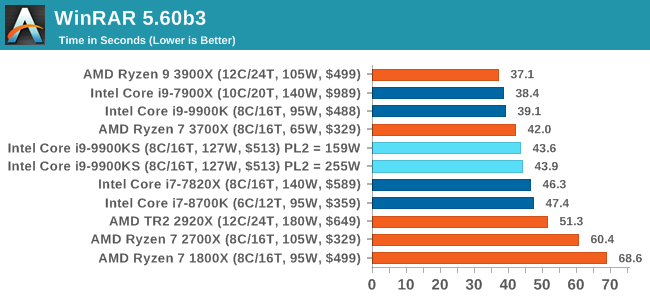
AES Encryption: File Security
A number of platforms, particularly mobile devices, are now offering encryption by default with file systems in order to protect the contents. Windows based devices have these options as well, often applied by BitLocker or third-party software. In our AES encryption test, we used the discontinued TrueCrypt for its built-in benchmark, which tests several encryption algorithms directly in memory.
The data we take for this test is the combined AES encrypt/decrypt performance, measured in gigabytes per second. The software does use AES commands for processors that offer hardware selection, however not AVX-512.
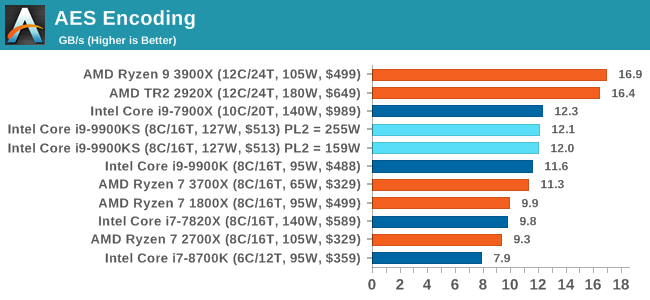










235 Comments
View All Comments
Opencg - Thursday, October 31, 2019 - link
People fail to consider other use cases. For competitive gaming or someone running 240hz 1080p with a high end gpu and willing to tweak settings to make their games cpu bound this is still the best cpu. Unfortunately not all testers optimize their cpu tests to be cpu bound in games. But if you look at the ones that do intel still poops on amd. Sure most gamers dont give a shit about fps above 160 or so but some do. When I ran overwatch I tweaked the config file and ran 400fps. If I was running csgo I would push the fps as high as possible as well.Also imo the biggest used case for amd cpus for gamers is futureproofing by having more cores. Most gamers are just gonna play their games with a few tabs open and maybe some music and discord running. Not everyone is running cpu based streaming encoding at the same time.
Galid - Thursday, October 31, 2019 - link
Well I don't seem to notice the same thing you do for max fps in games where you need 240hz for example. At most, I can see 10 to 15 fps difference in counter strike at around 400fps. I looked around and found a lot of tests/benchmarks. There is no such thing as ''this is the best cpu and you'll notice a difference in the games that matters for competitive gaming''. I might be wrong, if so, enlighten me please. I'm about to buy a new gaming rig and like 99.98% of the population, I'm not a competitive gamer. I don'T consider streaming as competitive neither.But, in ubisoft's single player games, I noticed it does help to get closer to the 120hz at resolution and details that matters for these non-competitive games.
Galid - Thursday, October 31, 2019 - link
BTW I compared ryzen 7 3700x and i9 9900k and got to the above conclusion.eek2121 - Friday, November 1, 2019 - link
Look at the 95th percentiles. Ignore average fps. AMD and Intel are virtually tied in nearly every game. I cannot believe we have reached this point. Finally after a decade, AMD is back in business.evernessince - Friday, November 1, 2019 - link
You do realize that running your CPU or GPU at 100% max utilization increases input lag correct? FPS isn't the only thing that matters. if the CPU cannot process new inputs in a timely matter because it's too busy with the GPU then the whole action of increasing your FPS was pointless. You should cap your FPS so that your neither your CPU nor GPU exceed 95% utilization. For the CPU this includes the core/cores that the game is running on. You loose maybe a handful of FPS by doing this but ensure consistent input lag.CptnPenguin - Friday, November 1, 2019 - link
Not sure how you managed that. The engine hard cap for Overwatch is 300 FPS.eek2121 - Friday, November 1, 2019 - link
Not true. AMD has the entire market pretty much cornered, though. So it doesn't matter whether you buy high end or mid range, Intel chips in general are a bad choice currently. Intel desperately needs to rethink their strategy going forward.bji - Thursday, October 31, 2019 - link
Well kudos for at least admitting that you are a blind fanboy early in your post.Slash3 - Thursday, October 31, 2019 - link
WCCFTech's comment section keeps leaking.Sivar - Thursday, October 31, 2019 - link
You might want to look at the benchmarks. Intel won most of them, with less cores.I was seriously considering an 8- or 12-core AMD, but Intel still ended up the better option for everything I do except video transcoding, in which AMD clearly wins.
Other considerations: No cooling fan on the Intel motherboard, better Intel quality control and testing in general, more mature product (because the 9900 is an iteration of an iteration of an iteration...etc.)